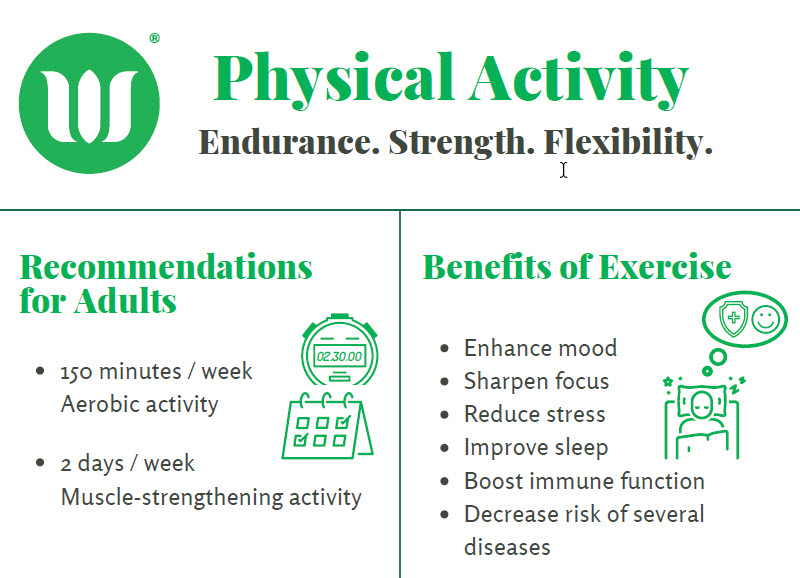Health Benefits of Physical Activity
About this PDF
Health Benefits of Physical Activity
Physical activity is recommended for nearly all Americans, from preschool-aged children through adulthood. The type of physical activity is important as different types of exercises provide unique benefits. Engaging in a range of activities can lead to significant positive changes in the body.
What Are the Three Types of Exercise?
Three types of exercise considered for the purposes of this infographic are endurance, strength, and flexibility. Endurance exercise, often referred to as cardio or aerobic activity, is any activity that increases breathing and heart rate. Activities that fall under this category include running, biking, swimming, walking, and jumping rope. Strength exercises, including resistance training and lifting weights, make the muscles in the body work harder than usual. Flexibility training, which often overlaps with balance exercises, consists of stretching muscles to help the body stay flexible. This pillar of fitness is often overlooked, but it is critical in allowing the body to move freely and engage in other types of exercises. Flexibility training includes stretching exercises, yoga, and Pilates.
Instead of trying to incorporate all types of exercise every day, one might focus on engaging in a variety of exercises over time to keep the body healthy and optimize each area of fitness. Endurance, strength, and flexibility exercises can often overlap; running increases your heart rate and stamina but can also strengthen the lower body. But each type of activity also has unique impacts on the body. Whereas strength-training specifically targets muscles, endurance training is especially beneficial for the cardiovascular system. Flexibility training can provide benefits throughout the body, enabling more efficient endurance and strength training in the future.
Health Benefits of Physical Activity
Physical activity positively affects nearly every body system, beginning with the very first session of exercise. Physical activity increases blood flow throughout the body, including to the brain, enhances neurotransmitter synthesis, and supports healthy inflammation resolution. It also optimizes neuroendocrine and physiological responses to stress which leads to greater resilience and allows the body to better handle stress – both physical and psychological. Together, these actions can significantly improve cognitive processes as well as mood, confidence, and sleep.
Engaging in regular exercise can also improve metabolic health. It increases energy expenditure, builds muscle mass, and preserves musculoskeletal function, all of which boosts metabolic health. It also reduces levels of stress hormones in the body, which can help with weight loss. In terms of immunity, physical activity can help mobilize immune cells which helps the body defend against pathogens and its ability to reduce inflammation can also help support healthy, effective immune responses.
Positive changes because of exercise occur almost immediately in the cells of the body. Consistent physical activity will continue to increase the benefits, and over a long time, physical activity can significantly decrease the risk of diseases including cancer, heart disease, and obesity.
How Often Should a Person Exercise?
Following the recommended physical activity guidelines can help individuals achieve health goals, increase fitness, and reduce the risk of many diseases. Adults should engage in at least 150 minutes of moderate intensity aerobic activity (or 75 minutes vigorous aerobic activity) throughout the week in addition to participating in strength-training exercises at least two days per week. These recommendations also apply to older adults and individuals with chronic conditions or disabilities as their ability and conditions allow and only when they can engage in these activities safely. Young children are encouraged to engage in active play throughout the day while older children and adolescents should try to engage in 60 minutes of moderate to vigorous physical activity every day. The focus should be on activities that are appropriate for their age, varied, and enjoyable. Pregnant and postpartum women should do at least 150 minutes of moderate intensity aerobic activity throughout the week under the care and monitoring of a health care provider.
How Does Nutrition Affect Exercise?
When including more physical activity in day-to-day life, it is vitally important to consider nutritional support. Physical activity puts stress on the body, but essential nutrients and bioactive compounds can provide the body with the fuel it needs to stay active. Several nutrients can enhance athletic performance, promote recovery, and/or protect components of the musculoskeletal system. Nutritional support that enhances athletic performance includes creatine, several B vitamins, and coenzyme Q10 (CoQ10). These nutrients are involved in energy production and may boost performance before and during exercise. After exercise, certain nutrients can help with recovery including protein, vitamin C, zinc, omega-3 fatty acids, and probiotics. These compounds provide vital building blocks to growing muscles, support healthy inflammation, and feed the microbiome so it can help regulate energy expenditure, inflammation, redox status, and hydration. Finally, nutrients can protect the musculoskeletal system by providing important components of bones, muscles, tendons, and ligaments, including calcium, vitamin D, protein, glucosamine, and chondroitin.
Additionally, adaptogenic herbs, those that help the body adapt to emotional and physical stress, can benefit anyone engaging in physical activity. This includes:
- Physical Activity Guidelines for Americans, 2nd edition. (2018). Centers for Disease Control and Prevention. https://www.cdc.gov/physicalactivity/resources/recommendations.html.
- Campbell, J.P., Turner, J.E. (2018). Debunking the Myth of Exercise-Induced Immune Suppression: Redefining the Impact of Exercise on Immunological Health Across the Lifespan. Front Immunol, 9:648.
- Kreider, R.B. (2003). Effects of creatine supplementation on performance and training adaptations. Mol Cell Biochem, 244:89.
- Gonçalves, A.-C., Portari, G.-V. (2021). The B-complex vitamins related to energy metabolism and their role in exercise performance: A narrative review. Sci Sports, 36(6):433.
- Cooke, M., Iosia, M., Buford, T., et al. (2008). Effects of acute and 14-day coenzyme Q10 supplementation on exercise performance in both trained and untrained individuals. J Int Soc Sports Nutr, 5:8.
- Mach, N., Fuster-Botella, D. (2017). Endurance exercise and gut microbiota: A review. J Sport Health Sci, 6(2):179.
- Bryer, S.C., Goldfarb, A.H. (2006). Effect of high dose vitamin C supplementation on muscle soreness, damage, function, and oxidative stress to eccentric exercise. Int J Sports Nutr Exerc Metab, 16(3):270.
- Hernández-Camacho, J.D., Vicente-García, C., Parsons, D.S., Navas-Enamorado, I. (2020). Zinc at the crossroads of exercise and proteostasis. Redox Biol, 35:101529.
- Fielding, R.A., Parkington, J. (2008). What Are the Dietary Protein Requirements of Physically Active Individuals? New Evidence on the Effects of Exercise on Protein Utilization During Post-Exercise Recovery. Nutr Clin Care, 5:191.
- Philpott, J.D., Witard, O.C., Galloway, S.D.R. (2018). Applications of omega-3 polyunsaturated fatty acid supplementation for sport performance. Res Sports Med, 27(2):219.
- Mickleborough, T.D. (2013). Omega-3 polyunsaturated fatty acids in physical performance optimization. Int J Sport Nutr Exerc Metab, 23:83.
- Calcium. Fact Sheet for Health Professionals.: National Institutes of Health. Office of Dietary Supplements.; [updated 6 Oct 2022; cited 25 Jan 2023]. Available from: https://ods.od.nih.gov/factsheets/Calcium-HealthProfessional/.
- Vitamin D. Fact Sheet for Health Professionals.: National Institutes of Health. Office of Dietary Supplements.; [updated 12 Aug 2022; cited 25 Jan 2023]. Available from: https://ods.od.nih.gov/factsheets/vitamind-healthprofessional/.
- Tsuruta, A., Horiike, T., Yoshimura, M., Nagaoka, I. (2018). Evaluation of the effect of the administration of a glucosamine containing supplement on biomarkers for cartilage metabolism in soccer players: A randomized double blind placebo controlled study. Mol Med Rep, 18:3941.
- Jerosch, J. (2011). Effects of Glucosamine and Chondroitin Sulfate on Cartilage Metabolism in OA: Outlook on Other Nutrient Partners Especially Omega-3 Fatty Acids. Int J Rheumatol, 2011:969012.
- Bucci, L.R. (2000). Selected herbals and human exercise performance. Am J Clin Nutr, 72:624S.




